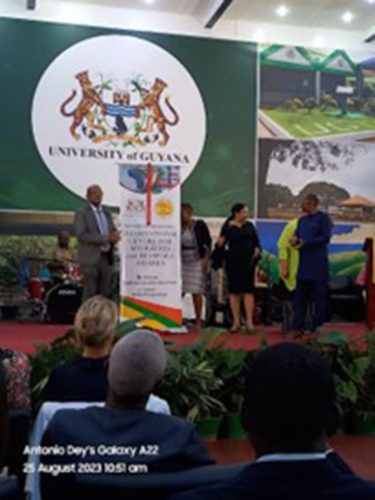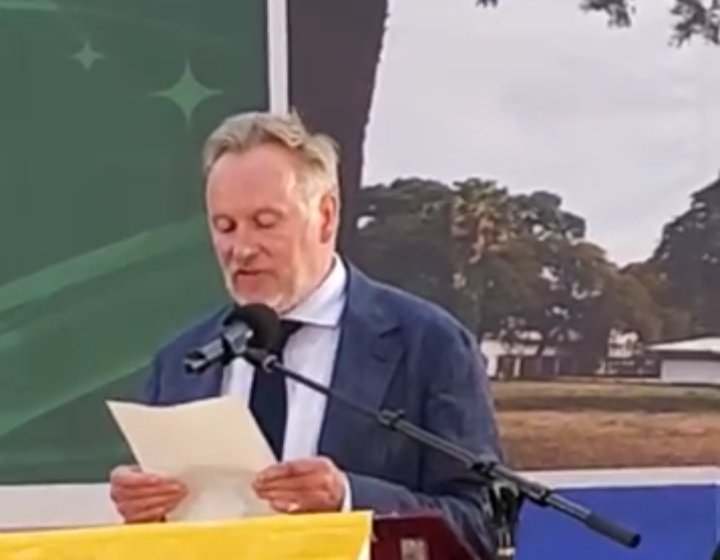By Antonio Dey
The descendants of slave owner, John Gladstone yesterday offered a historic apology for slavery and indentureship here amid a small protest at the University of Guyana (UG) where a diaspora studies centre was being launched
Following the reading of the apology there was an audible declaration of rejection and then protestors held placards demanding full reparations in a move that appeared to have caught the organisers of the event off guard.
Earlier, UG Vice Chancellor Dr Paloma Mohammed Martin welcomed the Gladstone family and noted that the apology is just one stepping stone towards achieving reparatory justice and expressed hope that it would bring healing to the Afro-Guyanese Society.

Chairman of the Guyana Reparations Committee and Member of the CARICOM Reparations Council, Eric Phillips said that the apology is in alignment with Caricom’s Ten Point Plan for Reparatory Justice.
He was however adamant that the other nine aspects of the plan must be fulfilled such as repatriation, the development of cultural institutions, illiteracy eradication, psychological rehabilitation etc.
The Gladstones will also financially aid the new research centre for migration and diaspora studies at UG.
After cultural presentations and renditions by Eze Rockcliffe, The Maska Jass Indian and African Fusion Group, Charles Gladstone walked to the podium to deliver the apology
It read “To the People of Guyana.
“We, the undersigned, are descendants of Sir John Gladstone, 1st Baronet of Fasque and Balfour, and wish to offer our sincerest apologies for his actions in holding your ancestors in slavery in Demerara, now Guyana.
“We are deeply honoured to be in Guyana at the invitation of The Guyana Reparations Committee and the International Centre for the Study of Migration and Diaspora at the University of Guyana.
“It is a particular honour to be here at the launch of this new and important department, whose work we are keen to support. We thank both of these organizations profoundly for welcoming us to Guyana and for supporting our attempts to create a brighter future.
“Slavery was a crime against humanity and its damaging impact continues to be felt across the world today. It is with deep shame and regret that we acknowledge our ancestor’s involvement in this crime and with heartfelt sincerity that we apologize to the descendants of the enslaved in Guyana. In so doing we acknowledge slavery’s continuing impact on the daily lives of many.
“We understand that we cannot change history, but we believe that we can have an impact on the world in which we live; and in apologizing for the actions of our ancestors, we hope to work towards a better future.”
“We support CARICOM’s Ten Point Justice Plan and urge the British government to enter into meaningful discussions with CARICOM so that both parties can move towards a better future together.
We also urge other descendants of those who benefitted from slavery to open conversations about their ancestors’ crimes and what they might be able to do to build a better future.
“We have been helping to fund some of the work of the Centre for the Study of the Legacies of British Slavery at University College London for the past two years and have committed to this for five years. We are funding other British cultural projects that seek to highlight the horrors faced by enslaved people and to educate British people about these crimes against humanity.
“As a wider family, we will be creating a financial fund to assist various projects in Guyana, and we will be discussing the use of these funds with our hosts. Our aim is to create meaningful and long-term relationships between our family and the people of Guyana.
“In writing this heartfelt apology we also acknowledge Sir John Gladstone’s role in bringing indentured labourers to Guyana and apologize for the clear and manifold injustices of this”.
The letter bore the signatures of Charles, Caroline, Robert, Felix, & Xanthe Gladstone and William Merison.
President Irfaan Ali was listed to appear at the event but did not do so. A day earlier in response to the intended apology by the Gladstone descendants, he noted that it is just a first step towards achieving comprehensive reparative justice, as the legacy of slavery extends far beyond the confines of historical memory.
“The apology offered by the descendants of John Gladstone underscores their willingness to confront their family’s dark past and to acknowledge the immense pain, suffering and indignities inflicted upon innocent persons through their family’s actions”, he stated.
John Gladstone
John Gladstone was an absentee owner of plantations in Jamaica and Guyana. He was also Chairman of the Liverpool West India Association, one of the most important groups defending the interests of West Indian plantation owners, and throughout his life, he was a champion of the institution of slavery.
His interests and acquisitions included at one time or the other, plantations at Belmonte, Coverden, Hampton Court, Industry, Met-en-Meer-Zorg, Success, Vreed-en-Hoop, Vreedenstein and Wales.
At the time of abolition, Gladstone received handsome compensation while the freed Africans received nothing.
After the end of the apprenticeship period, he anticipated a collapse in African field labour, and along with other planters, helped to pioneer the use of Indian indentured labour in British Guiana, introducing a new form of servitude to the colony.
However, serious abuses of Indian indentured immigrants on Gladstone’s Vreed-en-Hoop plantation were uncovered by a member of the Anti-Slavery Society.
Reparations
President Ali in his statement on Thursday noted that in recent years, the demands for reparations for African enslavement and indentureship have intensified.
He said that the call for reparations is not intended to promote or leverage shame or guilt over the slave trade and slavery. “It is not extortion. Instead, the demand for reparations is a commitment to righting historical wrongs.”
The Diaspora and Migration Centre has been established to pursue five specific areas of research interest including, but not limited to Diaspora and Migration in and around Academia, Youth, Technology and Vulnerable Communities, Indigeneity, Indentureship and Slavery as specific and integral aspects of dispersion.
The centre’s launching has also come in the midst of events to observe the 200th anniversary of the 1823 Slave Revolt in Demerara.






